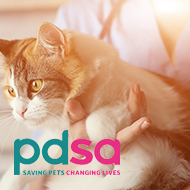Vet charity warns of ‘pet poverty’ crisis

The number of people enquiring to see if they are eligible for PDSA's services rose by 59 per cent over the summer.
Veterinary charity PDSA has warned of a ‘pet poverty’ crisis in the UK as many owners struggle with the financial impact of COVID-19.
The charity predicts that as many as 50,000 more pets will be eligible for its services over the coming months as a direct result of the economic hardship caused by the pandemic.
As such, the PDSA has launched an Emergency Appeal to raise vital funds so it can continue to care for pets across the UK.
Jan McLoughlin, PDSA director-general, said: “This winter, we’re facing the biggest challenge in our charity’s history. We’re experiencing unprecedented demand for our services, and since the start of lockdown, we have carried out more than 10,000 emergency and essential operations for pets in need.”
She added: “I’ve not known a pet care crisis like it in the 19 years I’ve been at PDSA. Without charitable support from the public, our PDSA Pet Hospitals may not be able to meet this additional demand for our services.”
Over the summer, the number of people enquiring to see if they are eligible for PDSA’s services rose by 59 per cent. Enquiries to PDSA’s Pet Hospitals from owners eligible for these services also increased by 81 per cent, adding more pressure to the organisation’s already-busy veterinary teams.
PDSA vet Paul Manktelow said: “We’re experiencing the start of a pet welfare crisis, as a result of Covid-19. We’re now facing extremely high levels of enquiries for our services. On average, we’re providing 2,000 remote consultations every day to desperate pet owners in need. For many sick and injured pets, whose owners are struggling financially, PDSA is their only emergency service.”
He added: “2020 has been a hard year for everyone and the pandemic has impacted on all our lives, but innocent pets shouldn’t suffer as a result of their owner’s hardship. As a nation of pet lovers, I hope people will support PDSA’s Emergency Appeal so that together we can reduce the impact of pet poverty caused by the pandemic.”



 The latest
The latest